九年级英语话题材料整理素材20 语言学习
- 格式:doc
- 大小:109.50 KB
- 文档页数:5
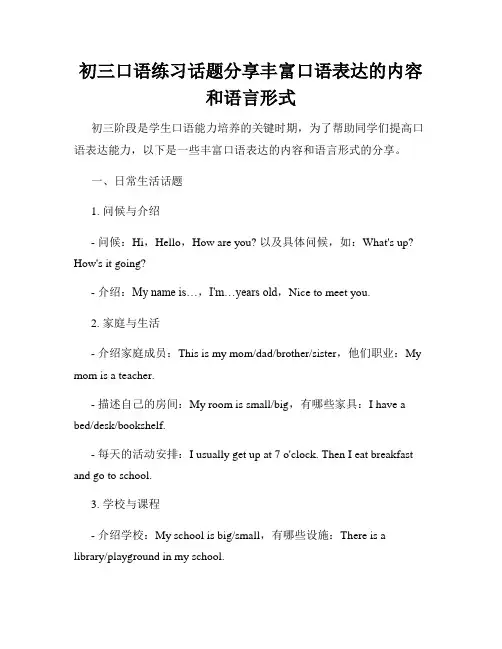
初三口语练习话题分享丰富口语表达的内容和语言形式初三阶段是学生口语能力培养的关键时期,为了帮助同学们提高口语表达能力,以下是一些丰富口语表达的内容和语言形式的分享。
一、日常生活话题1. 问候与介绍- 问候:Hi,Hello,How are you? 以及具体问候,如:What's up? How's it going?- 介绍:My name is…,I'm…years old,Nice to meet you.2. 家庭与生活- 介绍家庭成员:This is my mom/dad/brother/sister,他们职业:My mom is a teacher.- 描述自己的房间:My room is small/big,有哪些家具:I have a bed/desk/bookshelf.- 每天的活动安排:I usually get up at 7 o'clock. Then I eat breakfast and go to school.3. 学校与课程- 介绍学校:My school is big/small,有哪些设施:There is a library/playground in my school.- 描述课程:I like English/Math/Science,因为:Because it's interesting/challenging.二、兴趣爱好话题1. 运动- 描述喜欢的运动:I like playing basketball/football/swimming,因为:Because it's fun/healthy.- 邀请别人一起玩:Do you want to play basketball/football with me?2. 音乐与电影- 描述喜欢的音乐类型或歌手:I enjoy listening to pop/rock/classical music. My favorite singer is Taylor Swift.- 推荐一部电影:I recommend the movie "Avengers" because it's exciting/action-packed.3. 读书与写作- 描述喜欢的书籍类型:I love reading fantasy/mystery/romance novels. My favorite book is "Harry Potter".- 询问他人是否喜欢读书:Do you enjoy reading? What kind of books do you like?三、社交与交往话题1. 朋友与同学- 描述一个好朋友:My friend is kind/funny/smart,我们经常一起做什么:We often hang out/play games/study together.- 询问朋友的近况:How are you? How was your weekend?2. 旅行与观光- 描述一个喜欢的旅行地点:I love traveling to thebeach/mountains/historical places. It's so beautiful/peaceful.- 邀请朋友一起旅行:Do you want to go on a trip with me during the summer vacation?3. 活动与聚会- 描述一个有趣的活动:I attended a birthday party last week. We played games/danced/ate a lot of delicious food.- 邀请他人参加活动:Would you like to join us for a movienight/picnic this Saturday?以上是一些口语表达的内容和语言形式的分享,通过学习和练习这些日常生活、兴趣爱好、社交交往等话题,同学们可以更好地表达自己的观点和想法,提高口语水平。
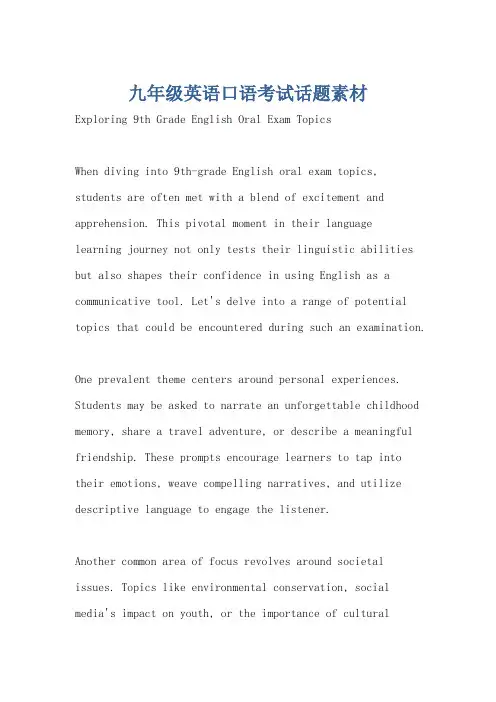
九年级英语口语考试话题素材Exploring 9th Grade English Oral Exam TopicsWhen diving into 9th-grade English oral exam topics, students are often met with a blend of excitement and apprehension. This pivotal moment in their languagelearning journey not only tests their linguistic abilities but also shapes their confidence in using English as a communicative tool. Let's delve into a range of potential topics that could be encountered during such an examination.One prevalent theme centers around personal experiences. Students may be asked to narrate an unforgettable childhood memory, share a travel adventure, or describe a meaningful friendship. These prompts encourage learners to tap into their emotions, weave compelling narratives, and utilize descriptive language to engage the listener.Another common area of focus revolves around societal issues. Topics like environmental conservation, socialmedia's impact on youth, or the importance of culturaldiversity prompt students to reflect on global challenges and express their opinions thoughtfully. These discussions not only enhance critical thinking but also foster empathy and awareness of world issues.Literature and media are also frequent contenders in oral exams. Students might be tasked with analyzing a book, film, or song they resonate with, discussing its themes, characters, and messages. This exercise not only sharpens analytical skills but also encourages students toarticulate their interpretations creatively.Furthermore, current affairs often find a place in these exams. Whether it's discussing recent news events, debating ethical dilemmas, or exploring technological advancements, students engage in real-world conversations, honing their ability to express opinions coherently and support arguments with evidence.On a lighter note, cultural topics add vibrancy to oral exams. From traditional festivals and customs to famous landmarks and cuisines, these discussions celebratediversity and broaden students' cultural awareness. Exploring these topics allows learners to appreciatedifferent perspectives and connect with global communities.Language learning itself can be a compelling topic.Students may share their language learning journey, discuss effective study strategies, or reflect on the importance of multilingualism in today's interconnected world. Such discussions not only reinforce language skills but alsoinstill a lifelong passion for learning and cultural exchange.In conclusion, 9th-grade English oral exams encompass arich tapestry of themes that stimulate students' linguistic, cognitive, and interpersonal skills. By delving into personal experiences, societal issues, literature, current affairs, culture, and language learning, students embark on a transformative journey of self-expression and cross-cultural understanding, laying a strong foundation fortheir future communication endeavors.。


专题 20 命题选材视角之语言学习40周年,随着改革向“深水区”推进,中外交流越来越多,语言学习或为高考的热门话题,通过阅读此类话题文章考生不仅可以领略西方语言尤其是英语的特点,而且可以了解语言背后的文化差异,从而培养考生积极的语言学习态度和浓厚的学习兴趣;培养考生良好的语言学习习惯。
在AThe Mandarin (普通话)speaking figure spins around a 360degree restaurant scene in an artificial intelligencedriven instruction program that looks like a giant video game. Rensselaer Polytechnic Institute students testing the technology move inside the 12foothigh projection (投影) to order virtual bean curd from the panda waiter, chat with Beijing market sellers and practice Tai chi by mirroring moves of a watchful teacher.“Definitely less anxiety than mess ing it up with a real human being,”says Rahul Divekar, a computer science graduate student. “So compared to that anxiety, this is a lot more easy.”The Mandarin Project is a joint enterprise of RPI and IBM. Cognitive and Immersive Systems Laboratory researchers are developing a sort of smart room that can understand students' words, answer their questions and observe their gesture s. Lessons are presented as games or tasks, like ordering a meal.Divekar orders Peking duck —“Beijing kaoya” — and the panda fetch es the virtual dish. Divekar says the food is good —“Cai hen hao chi” — but he can't pay the bill. No problem, the panda replies —“Ni keyi xi pan zi” — you can wash the dishes.Other scenes include an outdoor market and a garden, each a high-tech twist on cultural immersion.“Our plan is to complete several scenes of real life in China, to let the student be able to have a virtual trip over there,”says Hui Su, director of the lab at RPI.Tests on the room with students studying Mandarin will continue this school year as they work on additional scenes, including an airport. A six-week course is being readied for the summer.The Mandarin Project is notable for its scale and complexity. Computers interpret speech and gesture to keep a dialogue going. When a student points to a picture and asks “What's that?”computers can come up with an answer. Still, language teachers need not fear for their jobs just yet. Developers of the Mandarin Project say it isn't advanced enough right now to completely replace classroom instruction.RPI president Shirley Ann Jackson foresee s the same type of technology being applied to other space s, such as corporate boardrooms. “We're not at the end of the line,”Jackson says, “but closer to the beginning.”1.What is the advantage of learning via the Mandarin Project?A.It is thrilling.B.It is relaxing.C.It is effective. D.It is demanding.2.How do students learn Chinese in the Mandarin Project?A.By doing tests in the smart rooms.B.By learning from language teachers.C.By playing video games with Chinese.D.By conducting tasks in designed situations.3.Which of the following scenes is to be developed?A.Ordering food.B.Practicing Tai chi.C.Waiting at the airport.D.Buying things in a market.4.What can we infer from the last paragraph?A.Language teachers will be jobless soon.B.The technology has a promising future.C.The technology has come to an end.D.More foreigners will learn Chinese.BLanguages have been coming and going for thousands of years, but in recent times there has been less coming and a lot more going. When the world was still populated by hunter-gatherers,small, tightly knit (联系)groups developed their own pattern s of speech independent of each other. Some language expert s believe that 10,000 years ago, when the world had just five to ten million people, they spoke perhaps 12,000 languages between them.Soon afterwards, many of those people started settling down to become farmers, and their languages too became more settled and fewer in number. In recent centuries, trade,industrialization, the development of the nation-state and the spread of universal compulsory education. Especially globalization and better communications in the past few decade s, all have caused many languages to disappear,and dominant languages such as English,Spanish and Chinese are increasingly taking over.At present, the world has about 6,800 languages. The distribution of these languages is hugely uneven. The general rule is that mild zone s have relatively few languages. Often spoken by many people while hot wet zones have lots, often spoken by small numbers. Europe has only around 200 Languages: the Americas about 1,000,Africa 2,400; and Asia and the Pacific perhaps 3,200, of which Papua New Guinea alone accounts for well over 800.The median number (中位数)of speakers is a mere 6,000, which means that half th e worlds’ languages are spoken by fewer people than that.Already well over 400 of the total of, 6,800 languages are close to extinction(消亡), with only a few elderly speakers left. Pick, at random, Busuu in Cameroon (eight remaining speakers),Chiapaneco in Mexico(150). Lipan Apache in the United States(two or three)or Wadjigu in Australia (one, with a question-mark): none of these seems to have much chance of survival.5.What can we infer about languages in hunter-gatherer times?A.They developed very fast.B.They were large in number.C.They had similar patterns.D.They were closely connected.6.Which of the following best explains “dominant” underlined in paragraph 2?A.Complex. B.Advanced.C.Powerful. D.Modern.7.How many languages are spoken by less than 6,000 people at present?A.About 6,800.B.About 3,400.C.About 2,400.D.About 1,200.8.What is the main idea of the text?A.New languages will be created.B.Peoples lifestyles are reflected in languages.C.Human development results in fewer languages.D.Geography determines language evolution.CLanguage learning apps are very popular now and offer opportunities to learn vocabulary and practice grammar. But there has been a discussion about just how effective such apps can be.Among the most popular apps are Duolingo and Busuu. Previous research found positive results on the use of them. But these apps mainly concentrated on study with learners who had signed up for language courses and they only worked as after-school support, so the results were not always reliable. A recent study of 4,095 Busuu users has been carried out aimed to find out if users can actually learn a language with an app.Busuu provides learning material s for 12 different languages. It offers a special model where some content isavailable for free while some content is not. We find that its users are an even mix of men and women. More than half consider themselves to be at the beginner level as there is a decrease in users as their language levels go up. Most people use the app because of personal interest, or because they want to study or live abroad. Female users tend to use it less often but for longer periods of time than male users.Getting any feedback on Busuu depends on whether your answer is correct or not. While it is helpful, this is not the sort of feedback language teachers prefer, as it does not explain why the answer is right or wrong. In spite of this, feedback in the app is very highly rated.More than 92% of respondent s state that the app has met their expectations and 86% rate the app very highly. In fact, more than 80% of the users surveyed strongly agree that using the app has helped them improve their knowledge of the language they are learning.Besides, language learning apps also create an environment where mistakes are only known to the users, and this can address the performance anxiety that many learners suffer from when asked to speak a foreign language. So language teachers should encourage their students to use them to do the grammar work, leaving precious class time for more language communication.9.The results of the former research weren't always dependable because ________.A.it was only carried out before classB.it didn't consider users in classC.it just focused on positive resultsD.it used out-of-date methods10.What can we learn about the app Busuu from the text?A.All the content is free to use.B.Most users consider it satisfying.C.It's used by more advanced learners.D.It's more popular with female learners.11.Which of the following can probably replace the underlined word “address” in the last paragraph?A.Deal with.B.Write down.C.Turn to. D.Speak of.12.What is the main idea of the text?A.Students won't suffer anxiety in learning languages by using Busuu.B.Language learning apps are effective and satisfactory to language learners.C.Language learning apps are very popular with most language teachers.D.Students should be required to use apps for homework after class.答案:A语篇解读:美国伦斯勒理工学院和国际商业机器公司共同开发了一种帮助人们学习普通话的新技术,它通过让学生做一些场景中的任务或游戏来学习,让学生感到很放松。

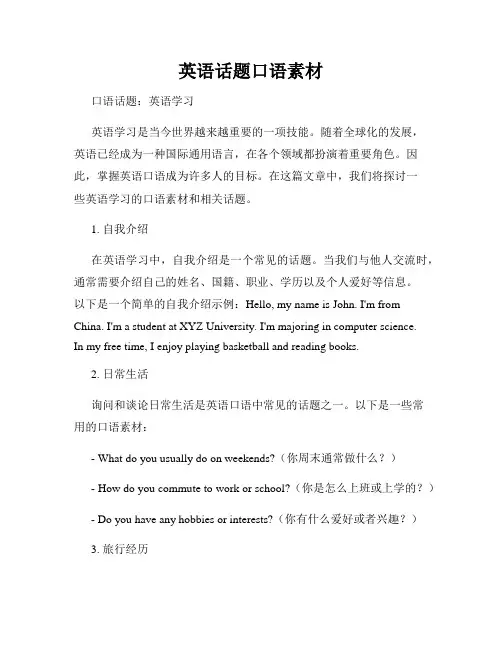
英语话题口语素材口语话题:英语学习英语学习是当今世界越来越重要的一项技能。
随着全球化的发展,英语已经成为一种国际通用语言,在各个领域都扮演着重要角色。
因此,掌握英语口语成为许多人的目标。
在这篇文章中,我们将探讨一些英语学习的口语素材和相关话题。
1. 自我介绍在英语学习中,自我介绍是一个常见的话题。
当我们与他人交流时,通常需要介绍自己的姓名、国籍、职业、学历以及个人爱好等信息。
以下是一个简单的自我介绍示例:Hello, my name is John. I'm from China. I'm a student at XYZ University. I'm majoring in computer science.In my free time, I enjoy playing basketball and reading books.2. 日常生活询问和谈论日常生活是英语口语中常见的话题之一。
以下是一些常用的口语素材:- What do you usually do on weekends?(你周末通常做什么?)- How do you commute to work or school?(你是怎么上班或上学的?)- Do you have any hobbies or interests?(你有什么爱好或者兴趣?)3. 旅行经历谈论旅行经历是一个广受欢迎的英语口语话题。
许多人喜欢分享他们的旅行经历。
以下是一些口语素材:- Have you ever been to any foreign countries?(你去过国外旅行吗?)- What was your favorite travel destination?(你最喜欢的旅行目的地是哪里?)- Could you share a memorable travel experience?(你可以分享一次难忘的旅行经历吗?)4. 工作经验谈论工作经验是英语口语中常见的话题之一。
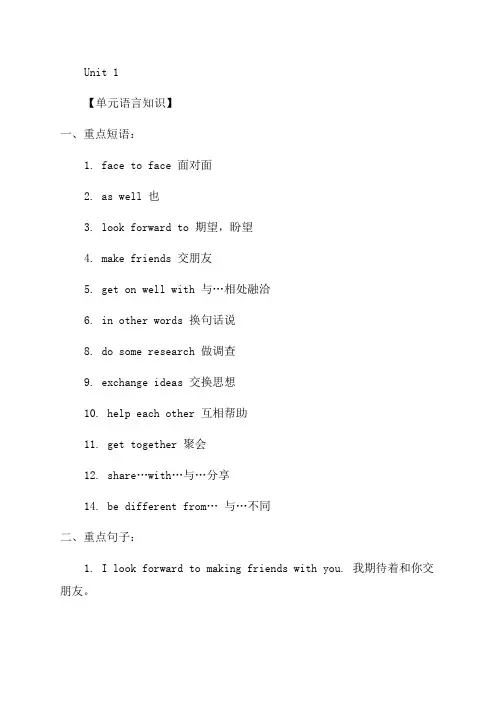
Unit 1【单元语言知识】一、重点短语:1. face to face 面对面2. as well 也3. look forward to 期望,盼望4. make friends 交朋友5. get on well with 与…相处融洽6. in other words 换句话说8. do some research 做调查9. exchange ideas 交换思想10. help each other 互相帮助11. get together 聚会12. share…with…与…分享14. be different from… 与…不同二、重点句子:1. I look forward to making friends with you. 我期待着和你交朋友。
2. In other words, they both like sports. 换句话说,他们两个都喜欢体育运动。
3. We can help each other with our schoolwork. 我们可以互相帮助办学校的学习。
4. Let’s get together an d share our ideas. 我们聚在一起,分享我们的思想吧。
Unit 2【单元语言知识】一、重点短语:1. write to sb 给人写信3. pass on 传递4. give out 分发,散发6. turn down 关小,调低7. look through 浏览8. too…to 太…而不能9. cut down on 减少10. on edge 紧张不安11. get a good night’s sleep 睡一个好觉12. go to bed early 早点上床睡觉13. face the problem 面对问题14. take it easy 放松,轻松二、重点句子:1. I usually write to my grandparents once a week. 我通常每周给我的祖父母写一封信。
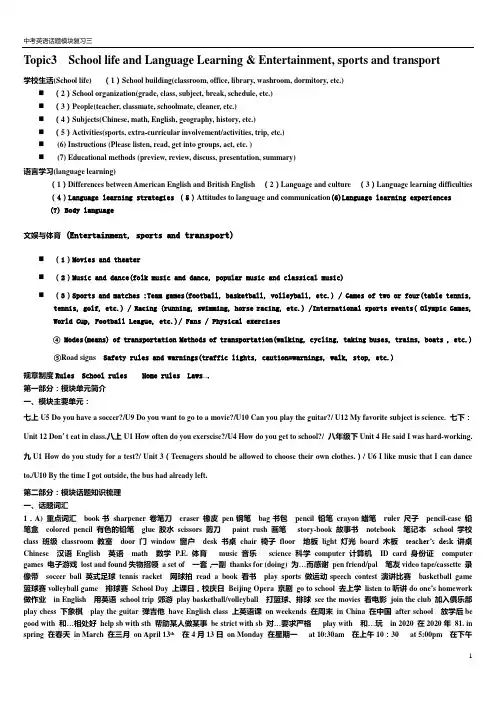
Topic3 School life and Language Learning & Entertainment, sports and transport学校生活(School life)(1)School building(classroom, office, library, washroom, dormitory, etc.)⏹(2)School organization(grade, class, subject, break, schedule, etc.)⏹(3)People(teacher, classmate, schoolmate, cleaner, etc.)⏹(4)Subjects(Chinese, math, English, geography, history, etc.)⏹(5)Activities(sports, extra-curricular involvement/activities, trip, etc.)⏹(6) Instructions (Please listen, read, get into groups, act, etc. )⏹(7) Educational methods (preview, review, discuss, presentation, summary)语言学习(language learning)(1)Differences between American English and British English (2)Language and culture (3)Language learning difficulties (4)Language learning strategies (5)Attitudes to language and communication(6)Language learning experiences(7) Body language文娱与体育 (Entertainment, sports and transport)⏹(1)Movies and theater⏹(2)Music and dance(folk music and dance, popular music and classical music)⏹(3)Sports and matches :Team games(football, basketball, volleyball, etc.) / Games of two or four(table tennis,tennis, golf, etc.) / Racing (running, swimming, horse racing, etc.) /International sports events( Olympic Games, World Cup, Football League, etc.)/ Fans / Physical exercises④ Modes(means) of transportation Methods of transportation(walking, cycling, taking buses, trains, boats , etc.)⑤Road signs Safety rules and warnings(traffic lights, caution=warnings, walk, stop, etc.)规章制度Rules School rules Home rules Laws….第一部分:模块单元简介一、模块主要单元:七上U5 Do you have a soccer?/U9 Do you want to go to a movie?/U10 Can you play the guitar?/ U12 My favorite subject is science. 七下:Unit 12 Don’t eat in class.八上U1 How often do you exerscise?/U4 How do you get to school?/ 八年级下Unit 4 He said I was hard-working.九U1 How do you study for a test?/ Unit 3(Teenagers should be allowed to choose their own clothes.)/ U6 I like music that I can dance to./U10 By the time I got outside, the bus had already left.第二部分:模块话题知识梳理一、话题词汇1.A) 重点词汇book书sharpener 卷笔刀eraser 橡皮pen钢笔bag书包pencil 铅笔crayon蜡笔ruler 尺子pencil-case 铅笔盒colored pencil 有色的铅笔glue胶水scissors剪刀paint rush 画笔story-book 故事书notebook 笔记本school 学校class 班级classroom 教室door门window窗户desk 书桌chair 椅子floor 地板light 灯光board 木板teacher’s desk 讲桌Chinese 汉语English 英语math 数学P.E. 体育music 音乐science 科学computer 计算机ID card 身份证computer games 电子游戏lost and found失物招领a set of 一套,一副thanks for (doing) 为…而感谢pen friend/pal 笔友video tape/cassette 录像带soccer ball 英式足球tennis racket 网球拍read a book 看书play sports 做运动speech contest 演讲比赛basketball game 篮球赛volleyball game 排球赛School Day 上课日,校庆日Beijing Opera 京剧go to school 去上学listen to听讲do one’s homework 做作业in English 用英语school trip 郊游play basketball/volleyball 打篮球、排球see the movies 看电影join the club 加入俱乐部play chess 下象棋play the guitar 弹吉他have English class 上英语课on weekends 在周末in China 在中国after school 放学后be good with 和…相处好help sb with sth 帮助某人做某事be strict with sb 对…要求严格play with 和…玩in 2020 在2020年81. in spring 在春天in March 在三月on April 13th在4月13日on Monday 在星期一at 10:30am 在上午10:30 at 5:00pm 在下午五点钟beat sb 打败某人win the match 赢得比赛stop doing sth 停止做某事use sth to do sth 用某物来做某事in my free time 在我的空闲时间tell jokes 说笑话be weak in 在某方面弱make progress 取得进步be careful 当心take notes 做笔记havetrouble doing sth / have nothing against doing sth不反对… in groups 成群的,按组的 eight hours’ sleep a night 每晚8小时的睡眠 get to class late . 上课迟到 an old people’s home 敬老院 perform a play for sb为…表演节目 primary schools 小学 newspaper office报社 reply to 回答,答复 a professional athlete 职业运动员 achieve one’s dreams实现某人的梦想make a decision 做决定 concentrate on…专注于…on display 展览. most of …的大多数keep healthy 保持健get together 聚在一起land v. 着落be late for 迟到. come out 出来6. native speaker 说本族语的人make up 组成、构成.only just 刚刚好、恰好break down 坏掉invite sb. to do sth. 邀请某人做某做事B) SUMMARY some keys1. by + doing 通过……方式如s:by studying with a groupby 还可以表示:“在…旁”、“靠近”、“在…期间”、“用、”“经过”、“乘车”等I live by the river./I have to go back by ten o’clock.The thief entered the room by the window.The student went to park by bus.2. talk about 谈论,议论,讨论如:The students often talk aboutmovie after class. 学生们常常在课后讨论电影。
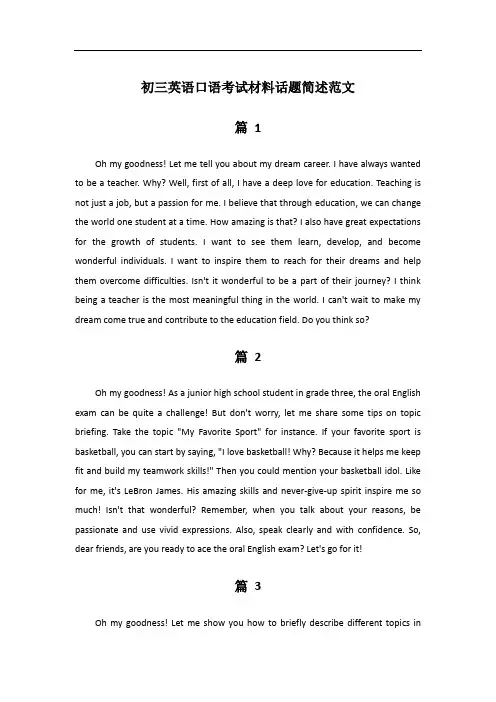
初三英语口语考试材料话题简述范文篇 1Oh my goodness! Let me tell you about my dream career. I have always wanted to be a teacher. Why? Well, first of all, I have a deep love for education. Teaching is not just a job, but a passion for me. I believe that through education, we can change the world one student at a time. How amazing is that? I also have great expectations for the growth of students. I want to see them learn, develop, and become wonderful individuals. I want to inspire them to reach for their dreams and help them overcome difficulties. Isn't it wonderful to be a part of their journey? I think being a teacher is the most meaningful thing in the world. I can't wait to make my dream come true and contribute to the education field. Do you think so?篇 2Oh my goodness! As a junior high school student in grade three, the oral English exam can be quite a challenge! But don't worry, let me share some tips on topic briefing. Take the topic "My Favorite Sport" for instance. If your favorite sport is basketball, you can start by saying, "I love basketball! Why? Because it helps me keep fit and build my teamwork skills!" Then you could mention your basketball idol. Like for me, it's LeBron James. His amazing skills and never-give-up spirit inspire me so much! Isn't that wonderful? Remember, when you talk about your reasons, be passionate and use vivid expressions. Also, speak clearly and with confidence. So, dear friends, are you ready to ace the oral English exam? Let's go for it!篇 3Oh my goodness! Let me show you how to briefly describe different topics inthe oral English exam for junior high school grade three. Take "An Unforgettable Trip" as an example. I went to the beautiful city of Hangzhou. There, I saw the West Lake with its clear water and green trees. The boats on the lake were like moving paintings!I also visited some ancient temples and tasted delicious local food. This trip not only broadened my horizons but also made me realize the charm of different cultures. How wonderful it was! Another topic could be "My Dream Job". I dream of becoming a doctor. Because I want to help people stay healthy and overcome diseases. I will study hard to achieve this goal. Isn't it inspiring? So, you see, in the oral exam, we just need to clearly express our thoughts and feelings about the topic. Isn't that simple and interesting?篇 4My family is the most precious thing in my life! I have a wonderful family. There are four people in my family: my parents, my elder sister and me. My father is a hardworking man. He always tries his best to provide a good life for us. My mother is kind and caring. She takes good care of our daily life. My elder sister is smart and helpful. She often helps me with my studies.The atmosphere in my family is always warm and harmonious. We share happiness and difficulties together. When I have problems, they always encourage and support me.My family is of great importance to me. It gives me love, strength and confidence. How lucky I am to have such a lovely family! I will do my best to love and protect them.篇 5Oh my goodness! Let me tell you about my favorite movie. It's a truly amazing film that has captured my heart. The story takes place in a magical world full ofadventure and surprises. The main character is a brave and kind-hearted young person who faces countless challenges but never gives up. The plot is full of twists and turns that keep you on the edge of your seat. The supporting characters are also very interesting and charming. They add so much depth and fun to the story. Watching this movie has made me believe in the power of courage and friendship. It has taught me that no matter how difficult the situation is, as long as we have the determination and the support of our friends, we can overcome anything. Isn't it wonderful? I think this kind of topic can be a great choice for the oral English exam in the third year of junior high school. It allows us to express our feelings and thoughts vividly and freely.。

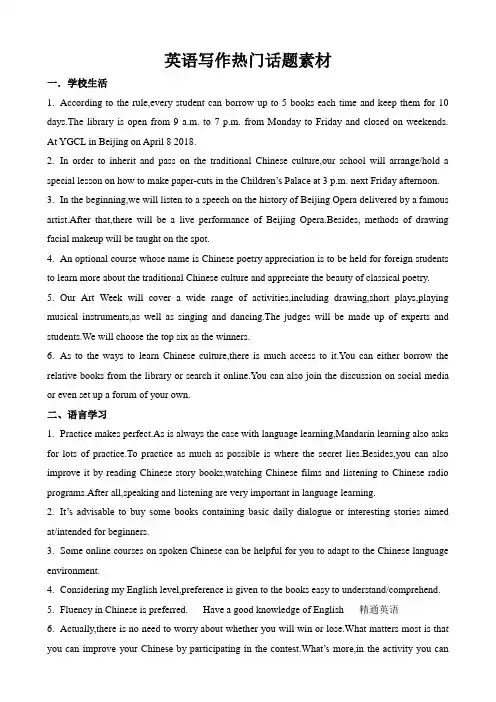
英语写作热门话题素材一.学校生活1.According to the rule,every student can borrow up to 5 books each time and keep them for 10 days.The library is open from 9 a.m. to 7 p.m. from Monday to Friday and closed on weekends. At YGCL in Beijing on April 8 2018.2.In order to inherit and pass on the traditional Chinese culture,our school will arrange/hold a special lesson on how to make paper-cuts in the Children’s Palace at 3 p.m. next Friday afternoon.3.In the beginning,we will listen to a speech on the history of Beijing Opera delivered by a famous artist.After that,there will be a live performance of Beijing Opera.Besides, methods of drawing facial makeup will be taught on the spot.4.An optional course whose name is Chinese poetry appreciation is to be held for foreign students to learn more about the traditional Chinese culture and appreciate the beauty of classical poetry.5.Our Art Week will cover a wide range of activities,including drawing,short plays,playing musical instruments,as well as singing and dancing.The judges will be made up of experts and students.We will choose the top six as the winners.6.As to the ways to learn Chinese culture,there is much access to it.You can either borrow the relative books from the library or search it online.You can also join the discussion on social media or even set up a forum of your own.二、语言学习1.Practice makes perfect.As is always the case with language learning,Mandarin learning also asks for lots of practice.To practice as much as possible is where the secret lies.Besides,you can also improve it by reading Chinese story books,watching Chinese films and listening to Chinese radio programs.After all,speaking and listening are very important in language learning.2.It’s advisable to buy some books containing basic daily dialogue or interesting storie s aimed at/intended for beginners.3.Some online courses on spoken Chinese can be helpful for you to adapt to the Chinese language environment.4.Considering my English level,preference is given to the books easy to understand/comprehend.5.Fluency in Chinese is preferred. Have a good knowledge of English 精通英语6.Actually,there is no need to worry about whether you will win or lose.What matters most is that you can improve your Chinese by participating in the contest.What’s more,in the activity you canmake more friends who have the same interest as you.三.节假日活动春节1.The Spring Festival is one of the most important and energetic festivals in China.It falls on the firs day of the first Chinese lunar month.Traditionally it’s a time for family reunion.2.People give their houses a thorough clean and decorate them with beautiful paper-cuts before the festival.3.Since the second day of the new year,people usually go to visit their relatives and friends and give some lucky money to children to bring good fortune.In some areas,people give singing and dancing performances to welcome the new year.重阳节1.The Double Ninth Festival is a day for us to show respect for the elderly in our culture.We usually go to make dumplings and cakes with the senior citizens.We also spend some fun time together singing,dancing and playing games.2.As some old people feel lonely,we may chat with them about their old days,changes of our city,or anything they are interested in.四.介绍类(一)介绍栏目The ”Foreign Culture” section/column in our newspaper carries art icles written by foreign friends about the culture of their home countries.(二)介绍物品The electronic dictionary has a good many functions.First,it can provide us with mutual /two-way translation between English and Chinese.Besides,spelling check,pronunciation guidance and words with similar or opposite meanings are also included.Apart from these,it is easy to carry/it is portable and operate because it’s light and its size is as small as 104mm*72mm*15mm.(三)介绍人物When it comes to the figure I like most in Chinese history,it should go to Hua Mulan.I admire her for her great wisdom,the courage in face of difficulty,and her devotion to her family and the country.Her spirit inspires me and millions of girls to live an independent life and make contributions to our country.My uncle is middle-aged and of average/medium height with a pair of thick glasses.He will bewearing a blue jacket that day.(四)介绍地点The gym of our school is located on the left of the teaching building.It has three floors,covering an area of 750 square meters.Our library is in the center of the school.In front of it is a beautiful garden and our teaching building is right behind it.(五)介绍天气、季节And it’s because spring arouses everyone’s hope that I’m keen on spring most.Look!The frozen ice is melting.Listen!All living creatures are waking up.Spring pictures a world where cold and death are fading away while warmth and life are coming back.Thus,everyone are is bound to be filled with hope and love.With spring coming,everything on the earth looks very fresh and full of energy,making our world take on a new look.(六)计划与愿望1.I’ve been scheduled to take a part-time job this summer vacation in a foreign company.I’ve just written a resume and my letter of application as required.2.I’m sorry to bother you but I wonder if yo u could be so kind as to spare some precious time to polish my draft.3.We are to gather at 7 a.m. at the school gate and set out twenty minutes later.4.You’ve expected to devote yourself to studies to live up to your parents’ expectations.5.I wish there would be more such wonderful and beneficial activities in the future.6.How time flies!As you know,the College Entrance Examination is approaching/around the corner,which also announces the end the this sort of stressful study life.I have made meaningful plans for the coming summer vacation.(七)热点话题1.As we all know,since COVID-19 spread over China,efficient measures have immediately been taken by the government.First and foremost,the government is fighting against COVID-19 with all might,building temporary hospitals in time.2.Furthermore,countless doctors bravely volunteer to head for Wuhan to save lives.Also,people from all walks of life willingly offer their contributions.All in all,so many encouraging deeds demonstrate to the world that we can score a victory against the disease.3.Scientists recommend taking necessary precautions,like wearing masks,washing hands frequently and thoroughly,avoiding touching your eyes,nose,or mouth with your hands,and staying away from people who have flu symptoms.4.You may be able to reduce the risk of infection by avoiding people who are sick.5.There is no doubt that it is an extremely serious problem.The government should take strong measures to deal with it.(八)科普知识与现代技术1.中国的高铁:I’d like to introduce China’s High-speed railway.The high-speed railway is one of the best means of transport in China.China’s advanced technology contributes to its high speed,comfort and safety,which enjoy great fame home and abroad.2.移动支付:As everyone can see,the Scan to Pay is of its convenience,many people,whether young or old,are paying by using their mobile phones.What they have to do is enter the app of Alipay or Wechat, and scan the QR code.The Scan to Pay is advantageous in that(because) it saves us the trouble of carrying cash on ourselves.Moreover,it enables us to pay whenever and wherever we like.。
第20课时九年级Units 9~10 高频话题写作2.如果你告诉朋友你要去他们家吃饭,你应该准时到。
If you tell a friend you are going to their house for dinner, you are supposed to arrive on time.句式仿写:如果有人邀请你正午见面,你应该正午(之前)就到那里。
If someone at noon, you at noon.3.在外国被接受的最佳方式之一就是试着理解人们是怎样想的。
One of the best ways to be accepted in a foreign country is to try to understand how people think.句式仿写:在中国被接受的最佳方式之一是理解人们是怎么接受和给予礼物的。
in China is to understand【典例剖析】假如你是刘华,要去英国参加为期半年的交换生项目。
请你根据以下要点提示,写信给外教Green先生,就英国文化礼仪方面的问题向他请教并请他给出建议。
词数:100左右。
要点提示:1.衣着服饰方面;2.接受邀请方面;3.馈赠礼物。
★审题谋篇(1)时态:使用一般将来时(2)人称:使用第一人称(3)模板★高分范文Dear Mr. Green,I am writing this letter to ask for some information about British customs.I will go to Britain and attend a student exchange program, which will last forhalf a year. However, I know little about British customs, so I have to seek your help.Would you like to give me some advice on dressing?In what kind of situation will Ineed to wear formal clothes and when should I just dress casually? Besides, I alsowant to know about the manners of accepting invitations and giving gifts.I would greatly appreciate it if you can give me any advice. I'm looking forwardto your reply.Yours,Liu Hua 【写作练兵】假如你叫张峰,你的笔友Paul要来中国学习一段时间,在到中国之前,他想了解中国的风俗习惯。
九年级全册知识点梳理Unit1 How can we become good learners?【重点短语】1. have conversation with sb. 同某人谈话2. too…to… 太……而不能3. the secret to… ……的秘诀4. be afraid of doing sth./ be afraid to do sth. 害怕做某事5. look up 查阅6. repeat out loud 大声跟读7. make mistakes in 在……方面犯错误8. connect ……with… 把……和……连接/联系起来9. get bored 感到厌烦10. be stressed out 焦虑不安的11. pay attention to 注意;关注12. depend on 取决于;依靠13. the ability to do sth.. 做某事的能力【考点详解】1. by + doing 通过……方式(by是介词,后面要跟动名词,也就是动词的ing形式)2. talk about 谈论,议论,讨论The students often talk about movie after class. 学生们常常在课后讨论电影。
talk to sb= talk with sb 与某人说话3. 提建议的句子:①What/ how about +doing sth.? 做…怎么样?(about后面要用动词的ing形式,这一点考试考的比较多)如:What/ How about going shopping?②Why don't you + do sth.? 你为什么不做…?如:Why don't you go shopping?③Why not + do sth. ? 为什么不做…?如:Why not go shopping?④Let's + do sth. 让我们做…...吧。
热点03 暑假暑假无疑是今年的火爆热点之一,它为我们的生活带来了极大的便利。
今天,选择的2021年中考英语写作预测话题是:暑假。
【预测题目】(一)你的美国朋友John计划暑假来中国旅游。
请你根据以下图示,用英语在QQ中给他留言,介绍并推荐你的家乡福建,词数80左右。
要求:1.必须包含所有提示信息,开头与结尾已给出,不计入总词数;2.意思清楚,表达通顺,行文连贯,书写规范;3.请勿在文中使用真实的姓校名及提示信息以外的地名。
Hi,John, I’m glad to hear that you're planning to travel around China during the summer vacation. I'd like to invite you to my hometown Fujian for a visit.Fujian lies________________________________________________________________________________ ____________________________________________________________________________________________ ____________________________________________________________________________________________ ____________________________________________________________________________________________ ____________________________________________________________________________________________ ____________________________________________________________________________________________ ____________________________________________________________________________________________ I'm looking forward to meeting you!【答案】Hi,John, I'm glad to hear that you’re planning to travel around China during the summer vacation. I,d like to invite you to my hometown Fujian for a visit,Fujian lies in the southeast of China with Fuzhou as its capital city. It has a population of over 38 million. Because of the nice environment, it’s known as Refreshing Fujian, which attracts millions of tourists from home and abroad. If you come, you can enjoy fresh air, blue sky as well as beautiful mountains and clear rivers. Many famous places of interest like Mount Wuyi and Gulang Island are well worth visiting. Besides,you can taste various kinds of delicious food.I'm looking forward to meeting you!【解析】这是一篇看图作文。
Unit 1 How can we become good learners?本单元话题为“学会学习”,与之相关的话题作文主要为谈论英语学习方法,这是各地中考英语真题中最常考的话题作文之一。
写作时可根据具体要求或提示,对相关的学习方法提出建议。
写作此类话题作文的常用表达有:(1)What about listening to…?(2)Try to guess …by…(3)The more…,the more…(4)…is the secret to language learning.(5)I think…should…(6)It’s a good idea to…【典型例题】为了交流学习经验,提高学习效率,某初中英语学习报正在举办以“how to be a good learner”为题的征文比赛,请踊跃投稿。
【优秀范文】How to be a good learnerTo be a good learner, we should have good habits and ways of learning.We need to get ready for our lessons before class and always listen carefully in class. After class, we must go over the lessons and finish our homework on time. It’s good to study in groups and help each other. We should do more reading in our free time. If we have any problem s, we’d better ask others for help.As a student, working hard is important, but don’t forget to do sports and keep healthy.I think all above is helpful to us to be a good learner.。
1.学习英语口语的话题你什么时候开始学习英语的?When did you begin to learn English?For example:A:When did you begin to learn English?你什么时候开始学习英语的?B: I started to learn English when I was in primary school.我从小学的时候就开始学习英语。
你的英语很流利。
Your English is fluent.For example:A: Your English is fluent.你的英语很流利。
B: Thank you.谢谢夸奖。
你学英语多久了?How long have you studied English?For example:A: How long have you studied English?你学英语多久了?B: I have studied English for about ten years.我学英语差不多有十年了。
我不知道你的母语是什么。
I don't know what your native language is.What's your native language?英语是我的母语。
2.快速学习音乐的方法一、听欧美歌曲要提醒大家注意的是:不要选择rap(说唱)类歌曲,因为语速太快。
一般的pop(流行类)都行。
歌曲有旋律有节奏,听着也不枯燥。
如果只是为了背单词去看歌词那这首歌会让你觉得很烦。
可以自己先听,看看有哪些地方没有听出来再看歌词。
二、睡前听半小时睡前听到的东西依然能够被大脑吸收。
三、学会听自己的声音录音之后就有了“证据”,一对比立马知道缺点。
只要肯坚持,即使平时没有机会开口,也可以练成漂亮的发音。
四、模拟提高口语能力的第一步就是模拟生活里的情节,模拟以英语为母语的人的语音和语调。
五、朗读提高口语能力的第二步是大声朗读。
英语九年级的短语话题以下是英语九年级的一些常见短语话题:1. be convenient to do sth:做某事很方便。
2. a pair of:一对,一双,一副。
3. between A and B:在a和b之间。
4. on one’s / the way to:在去……的路上。
5. rain off:因下雨延期。
6. pardon me:什么,请再说一遍。
7. pass by:路过,经过。
8. look forward to:盼望,期待。
9. excuse me:打扰了,请原谅。
10. get some magazines:得到一些杂志。
11. get some information about:获取有关……的一些信息。
12. turn left/right:向左/右转。
13. good learners:优秀的学习者。
14. work with friends:和朋友一起学习。
15. study for a test:备考。
16. have conversations with:与……交谈。
17. speaking skills:口语技巧。
18. the secret to ...:……的秘诀。
19. because of:因为。
20. so that:以便,为了。
21. the meaning of ...:……的意思。
22. make mistakes:犯错误。
23. depend on:依靠,依赖。
24. in common:共有的。
25. pay attention to:注意,关注。
26. connect … with …:把……联系起来。
27. for example:例如。
28. think about:考虑。
29. even if:即使,尽管,纵容。
30. look for:寻找。
31. worry about:担心,担忧。
32. make word cards:制作单词卡片。
九年级英语话题材料整理素材20 语言学习主要分布在八下U9和九年级U1一、常用单词:1.抽认卡flashcard2.词汇vocabulary3.出声地;大声地aloud4.发音法pronunciation5.发音pronounce6.记住;熟记 memorize7.语法 grammar8.使失望frustrate9.令人失望的frustrating 10.错误;过失 mistake11.口语的 spoken 12.害怕的 afraid 13.完整的 complete 14.秘诀;诀窍secret二、常用词组1.查找,查阅 look up2.编造make up3.犯错误make mistakes4.害怕去做 be afraid to5.嘲笑laugh at6.做笔记take notes7.小组学习work with friends8.制作抽认卡 make flashcards9.看课本read textbooks 10.列出单词清单 make vocabulary lists 11.听磁带listen to tape s 12.看英语录像带watch English-language videos 13.向老师寻求帮助 ask the teacher for help 14.发音不准确get the pronunciation right 15.大声朗读 read aloud 16.提高口语技能 improve speaking skills 17.口语spoken language 18.忘记许多新单词forget a lot of new words 19.进行大量的写作训练 get much writing practice三、常用句子:1.Why do you study English? 你为什么学英语?2.I want to understand English language movies.我想要看懂英语电影。
3.It’s fun to learn another language.学习另外一种语言很有趣。
4.I want to travel. 我想要旅行。
5.I want to study in an English-speaking country. 我想要在一个说英语的国家学习。
6.What about reading aloud to practice pronunciation? 大声朗读来练习发音怎么样?7.I can’t get the pronunciation right我发言不正确。
8.I forget a lot of new words。
我忘掉许多新单词。
9.Why don’t you join an English club to practice speaking English ?你为什么不加入英语俱乐部来练习说英语呢?10.The best way to learn new words is by reading English magazines .学新单词的最佳方法是通过阅读英语杂志。
11.Memorizing the words of pop songs helps a little记忆流行歌曲的单词有点用。
12.He thinks studying grammar is a great way to learn English他认为学习语法是学英语的好方法。
13.He finds watching movies frustrating because the people speak too quickly他发现看电影令人沮丧因为演员说的太快了。
14.I couldn’t understand every word. 我不能理解每个单词。
15.I am afraid to speak in front of the class. 我害怕在全班面前说。
16.I couldn’t make complete sentences 我不能写完整的句子。
17.I thought my classmates may laugh at me.我本来以为同学可能会嘲笑我。
18.I decided to take lots of grammar notes in class我决定在课堂上记许多语法笔记。
19.If you don’t know how to spell new words ,pleases look them up in a dictionary如果你不知道怎样拼写新单词,请到字典里查。
四.情景交际1补全对话Ms Mitchell: You look worried, Paul.Paul: I am, Ms Mitchell. I'm having trouble ____1____ English.Ms Mitchell: You said you liked English. What's the problem?Paul: I can't get the __2_____right.Ms Mitchell: Well, listening can help. Why don't you borrow the teacher's tapes? You can listen to them at home and repeat the sentences that are difficult for you. Paul: That's a good idea. But what about all the new words? I __3____a lot of new words.Ms Mitchell: You can always write the new words in your note book and study them at home. You can even study in the train on the way to school.Paul: That might really help! Thanks.Ms Mitchell: Can you understand when people talk to you?Paul: Well,no. Not always. Sometimes I just don't understand what people are saying. Ms Mitchell: Why don't you ____4__ an English language club to practice __5___ English? The Engli sh club meets after school on Tuesdays Thursdays.Paul: Maybe I'll go. The only other problem I have is that I don't get much writing practice.Ms Mitchell: Maybe you should find a pen pal .Paul: That sounds like a fun way to practice ___6____. Thanks Ms Mitchell.II情景提示:7.想知道同学如何学习准备考试,该怎么问?___________________________________________________________________8.如何表达朋友一起编英语对话是一个学习英语的好办法___________________________________________________________________9.如何表达你在造出完整的英语句子方面有困难___________________________________________________________________10.想鼓励同学在学习英语时别害怕犯错误,该怎么说?___________________________________________________________________III语篇情景:在空白处填入适当的短语。
This week we asked students at New Star High School about the best ways to learn more English. Many said they learnt by using English. Some studen ts had more specific suggestions. Lillian Li, for example, said the best way to learn new words was by reading English magazines. She said that____11_______ of pop songs also helped a little. When we asked about studying grammar, she said, “I never study grammar. It’s too boring.” Wei Ming feels differently. He’s been learning English for six years and really loves it. He thinks studying grammar is a great way to learn a language. He also thinks that ______12_______ isn’t a bad way because he can watch the actors say the words. Sometimes, however, he finds watching movies frustrating because the people speak too quickly. Liu Chang said that joining the English clubat school was the best way to improve her English. Students get lots of practice and they also have fun. She added that____13______ with friends was helpful. “五、完型填空Most people in the United States speak English. There are over 2000 languages spoken throughout the world. You know that every language has ____1_____ own words. ___2____ you want to learn a foreign language, you must learn its words. You must know ___3____ the words mean, and you must say them in the right ____4_____. Words are ____5____ up of sounds and different languages have different sounds. There are thousands of language sounds. When you _____6______ English, you are using only about fifty of them.Some languages are spoken faster than ____7______. English is spoken ____8____ slowly than French. Women speak ____9____ than men. In American women speak about 175 words every minute, w___10____ men speak about only 150. How many words do you speak every minute?( )1A.influenced B. include C. important( )2.A.If B In C. As( )3.A.how B . what C. why( )4.A. way B. mean C. sound( )5.A. make B. made C. makes( )6A. speak B. spell C. say( )7.Aanother B. the other C. others( )8A.more B. much C .many( )9.A.fast B. quickly C. faster( )10.A.when B. while . C. where六、阅读理解:根据短文内容选择最佳答案。